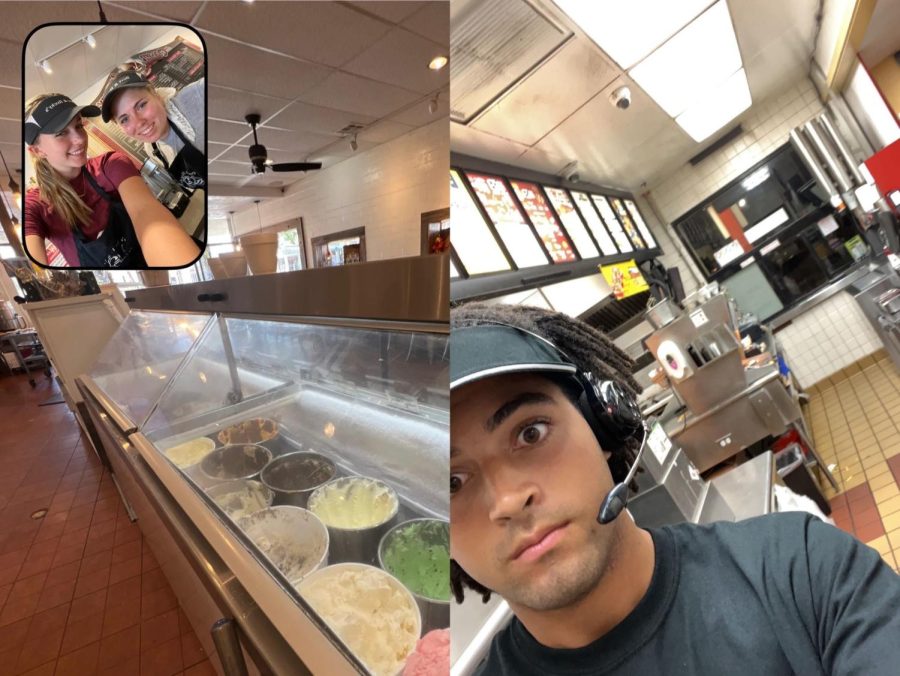A student leaves school after a long sports practice at 6 p.m., and instead of having dinner with their family and working on school assignments, they drive straight to their part-time workplace.
A four-and-a-half-hour shift exhausts them both physically and mentally. The clock ticks and ticks until midnight when they clock out and head home, but they are then met with another pile of work from school.
Forced to work late into the night, it begs the question: How can Webb support working students?
Webb’s exemption policy from afternoon activities does not permit students’ requests upon working a part-time job. Defying Webb’s Unbounded philosophy, the exemption guidelines limit a student’s ability to grow in a different environment from school: the workplace. Especially for day students, a part-time job after school is not considered as “meeting the criteria” for an exemption, regardless of the impact that these restrictions put on the student’s daily and social life.
Exemptions are granted for students who are seeking sports or activity opportunities that the school does not offer for skill development during their off-season. An exemption can only be established with approval from Steve Wishek, Director of Athletics and Afternoon Activities and meeting certain criteria like proof of one’s good citizenship, academic record, and approved self-provided transportation.
In addition, having family members as supervisors and joining Webb-offered sports during the season disqualifies a student for an exemption; jobs, internships, or independent study are being excluded from exemptions.
24 hours is not enough for even an adult to balance work and personal life, let alone a student without an exemption from their afternoon activity. Coming out of an academically competitive environment and afternoon activity every day at six o’clock in the afternoon, it is almost impossible for students to get a job that conveniently fits their homework and sleeping schedule. Lack of sleep may affect a student’s ability to focus on class discussions, readings, and lectures. The result is reflected in their productivity: lower performance in school and grade fluctuation.
Not only are the students’ daily life being interrupted, but also their social life. Without an exemption, students might have to sacrifice their free time during the weekend to work instead of resting and preparing for the following school week. With a back-to-back schedule like this, working Webb students are not able to take a break before they repeat this overwhelming cycle of work and school again.
“I work only on the weekends because I have commitments like volleyball and school.” Camile Casper (‘24) said. “It affects my social life because I can’t always make it to things my friends are doing.”
For boarders, the struggle emerges at the start of the conversation. Boarding students face restrictions that narrow down the amount of job opportunities available without the exemption. The hours they can work are extremely limited, and it is difficult to find work that only allows students to come in for six hours during the weekend. It is hard for a student with a sparse job resumé to find an employer that will let them work only on weekends with limited experience.
The restrictions that Webb imposes over a student’s personal life and their ability to make a living are extremely constraining. Students may have various reasons to get a part-time job, such as helping their family or earning money for personal use. As each household functions differently, parents have distinct ways of raising their children; they do not fund every aspect of their daily life, like gas, food, and personal expenses. Unless Webb is willing to fund students who need their own income, allowing an exemption for a job should be a reasonable option.
“Well, for me, I need a job on the weekend since my parents don’t pay for my gas, so I have to.” Alejandro Fountain (‘24) said.
Along with money, students gain experience in the workplace from having a job in high school that prepares them for future in the workforce, specifically in college. Part-time jobs or internships after school serve as a platform for students to expand upon the knowledge not found in school and put skills into practice. Having a job can also teach students how to efficiently manage their time in real-world scenarios and handle personal income. Webb’s environment, a safe space to fail, does not accommodate this type of learning.
“It’s better to start earlier in high school and gain some experience before being in college and entering the workforce.” said Clarence Deng (‘23), a local boarder who is seeking a part-time job.
With an exemption for a job, students would be able to manage the workload at school while also having ample time in their day to cover other activities. Webb should be encouraging students to take the initiative to explore the workforce rather than holding them back. Students should have the choice to work in a different environment than Webb, so having the option for job-specific exemptions encourages students to seek out new and “unbounded” experiences.







![Many Webb students spend their free time in the library watching a popular TV show like Riverdale and Euphoria. “Based off what I’ve seen, like in Euphoria, because the actors are older, they don't showcase an actual high school life properly,” Sochika Ndibe (‘26) said. “Since [the actors] are older [and] playing a teenager, from a girl’s perspective, it is going to make you think you should look more developed at a young age.” The actor, who plays Veronica Lodge, was 22 years old at the time of filming.](https://webbcanyonchronicle.com/wp-content/uploads/2025/03/Antecol-Media-affects-how-society-functions-graphic-1200x900.png)


